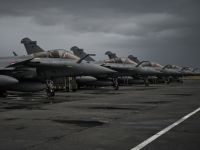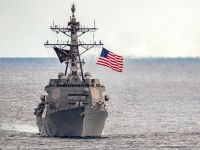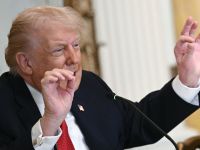Group of Eight leaders prepared Thursday to chart a course for the Internet age but were upstaged by a back-from-the-dead drama in Middle East peace talks.
The three-day G8 summit starting Friday in Japan's southern Okinawa island runs the gamut of world affairs, from the Internet revolution to AIDS and preventing global conflict.
US President Bill Clinton's attendance was left hanging until the last second by talks between Israelis and Palestinians at the presidential retreat of Camp David.
Within two hours of declaring the talks dead, an exhausted Clinton announced the two sides' leaders would carry on, and then flew off to the G8 summit in Okinawa's Nago city for a curtailed visit.
The G8 will likely make a statement of support for the Middle East talks, to be shaped by a report from Clinton, said a Japanese government official, speaking on condition of anonymity.
The US leader will be fighting on multiple fronts.
Russian President Vladimir Putin arrives at the meeting Friday for his G8 first appearance, ready to tackle Clinton over the threat to disarmament posed by a US scheme for an anti-ballistic missile shield.
In a pre-summit Asian tour, Putin won backing from Chinese President Jiang Zemin and North Korean supreme leader Kim Jong-Il against the national missile defense (NMD) scheme.
He secured ammunition with a pledge from Pyongyang to abandon missile development in return for rocket technology to help a supposed space program.
Washington, which cites the threat of a ballistic missile attack from rogue states including North Korea as a reason for the NMD, has so far reacted coolly to Putin's breakthrough.
Clinton must make a decision on whether to deploy NMD this year.
About 20,000 Japanese people circled Kadena Air Base, the biggest US air base in East Asia, and blared anti-US military protests on the day before Clinton's arrival.
Crimes by US troops have fuelled anti-US sentiment on the island, home since World War II to two thirds of the 47,000 US troops stationed in Japan under a joint security agreement.
German Chancellor Gerhard Schroeder was the first G8 leader to arrive in Okinawa on a direct flight, followed by British Prime Minister Tony Blair and European Commission President Romano Prodi, both of whom had stopped over in Tokyo.
Japanese Prime Minister Yoshiro Mori was scheduled to arrive from Tokyo later Thursday.
Canadian Prime Minister Jean Chretien, Italian Prime Minister Giuliano Amato and French President Jacques Chirac were in Tokyo but scheduled to arrive in Okinawa Friday.
The leaders of Britain, Canada, France, Italy and the host Japan met earlier in the day in Tokyo with developing world chiefs to discuss debt relief.
South African President Thabo Mbeki, Thai Prime Minister Chuan Leekpai, Nigerian President Olusegun Obasanjo and Algerian President Abdelaziz Bouteflika pressed their cause.
Nigeria said it was set to pay at least 1.5 billion dollars in debt servicing this year.
"I want to spend all that on health, but how can I, when even for 1.5 billion dollars I am being called names, I am being chased, I am being parried and hurried and harried because they (creditors) believe that they must get their money at all costs," Obasanjo said after the meeting.
More than 20,000 police and Coast Guard workers were patrolling by air, sea and land to protect the G8 meeting, which cost 81.4 billion yen (754 million dollars) to put on.
Key issues include bridging the so-called digital divide in which some people can access the Internet and others cannot, fighting poverty, and battling the diseases of HIV/AIDS, malaria and tuberculosis -- NAGO, Japan (AFP)
© 2000 Al Bawaba (www.albawaba.com)







